TUI Travels Case Study: Addressing Problems in Future Sustainability
VerifiedAdded on 2023/06/15
|9
|2272
|340
Report
AI Summary
This report investigates the challenges faced by TUI Travels in maintaining future sustainability within the travel and tourism sector. It begins by outlining the conceptual framework of future sustainability, emphasizing its pillars: environmental, economic, and social. The report then delves into the specific problems TUI Travels encounters, such as measuring carbon footprint and effectively utilizing resources. Furthermore, it explores strategies TUI Travels can implement to overcome these challenges, including adopting eco-friendly practices and educating employees about the importance of sustainability. The research methodology employs a quantitative approach, utilizing a survey strategy to gather data and analyze potential solutions for TUI Travels to enhance its sustainability efforts.
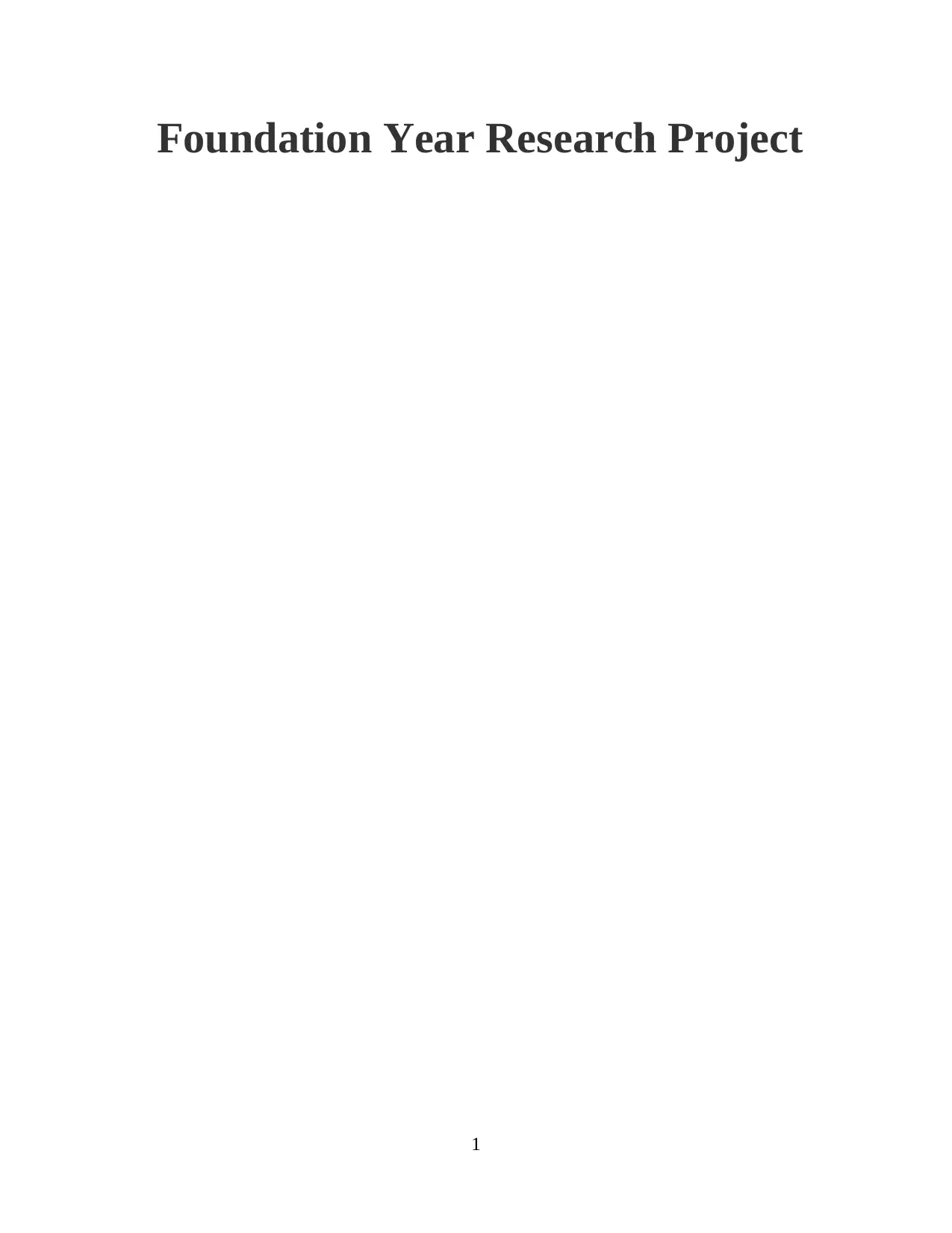
Foundation Year Research Project
1
1
Paraphrase This Document
Need a fresh take? Get an instant paraphrase of this document with our AI Paraphraser
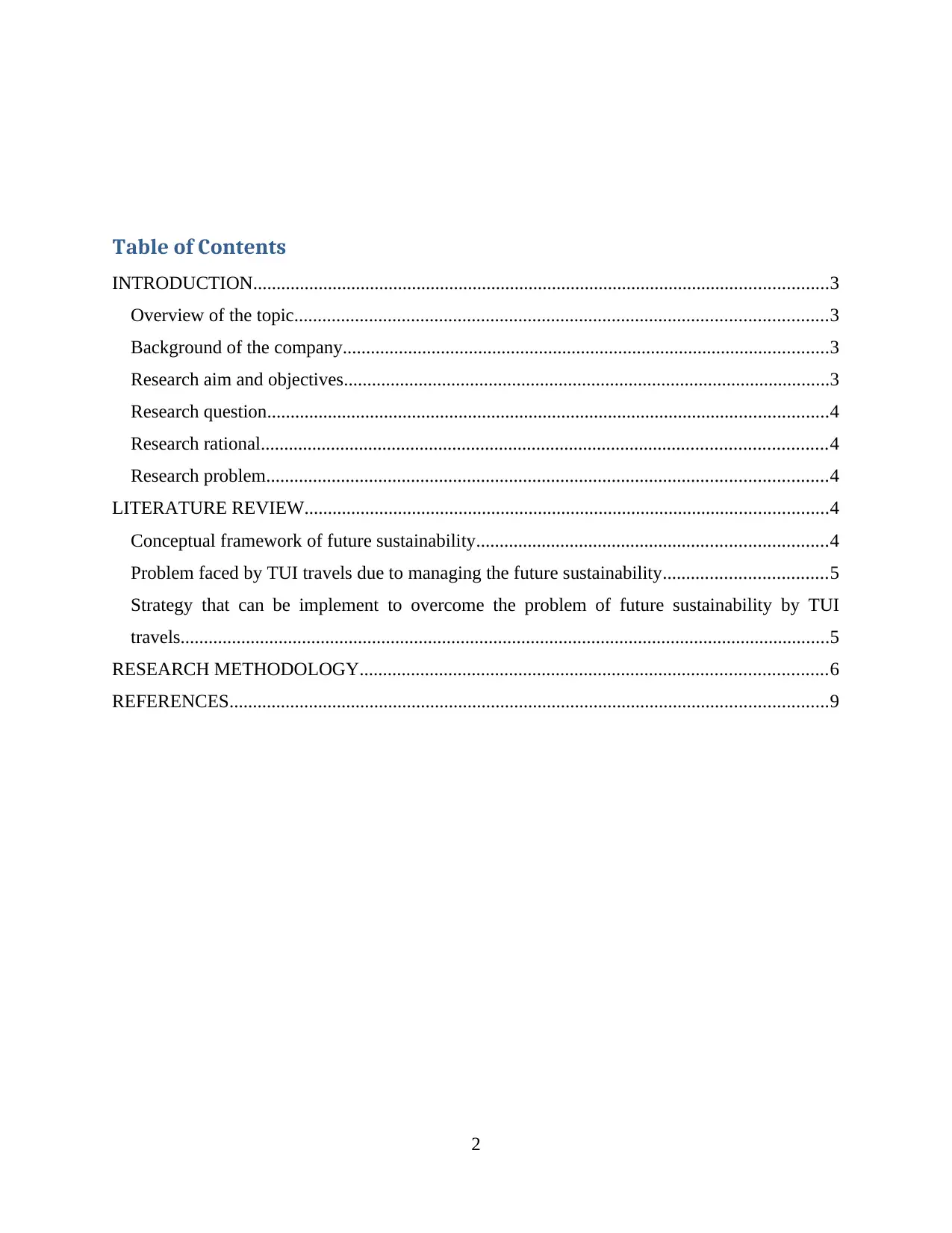
Table of Contents
INTRODUCTION...........................................................................................................................3
Overview of the topic..................................................................................................................3
Background of the company........................................................................................................3
Research aim and objectives........................................................................................................3
Research question........................................................................................................................4
Research rational.........................................................................................................................4
Research problem........................................................................................................................4
LITERATURE REVIEW................................................................................................................4
Conceptual framework of future sustainability...........................................................................4
Problem faced by TUI travels due to managing the future sustainability...................................5
Strategy that can be implement to overcome the problem of future sustainability by TUI
travels...........................................................................................................................................5
RESEARCH METHODOLOGY....................................................................................................6
REFERENCES................................................................................................................................9
2
INTRODUCTION...........................................................................................................................3
Overview of the topic..................................................................................................................3
Background of the company........................................................................................................3
Research aim and objectives........................................................................................................3
Research question........................................................................................................................4
Research rational.........................................................................................................................4
Research problem........................................................................................................................4
LITERATURE REVIEW................................................................................................................4
Conceptual framework of future sustainability...........................................................................4
Problem faced by TUI travels due to managing the future sustainability...................................5
Strategy that can be implement to overcome the problem of future sustainability by TUI
travels...........................................................................................................................................5
RESEARCH METHODOLOGY....................................................................................................6
REFERENCES................................................................................................................................9
2
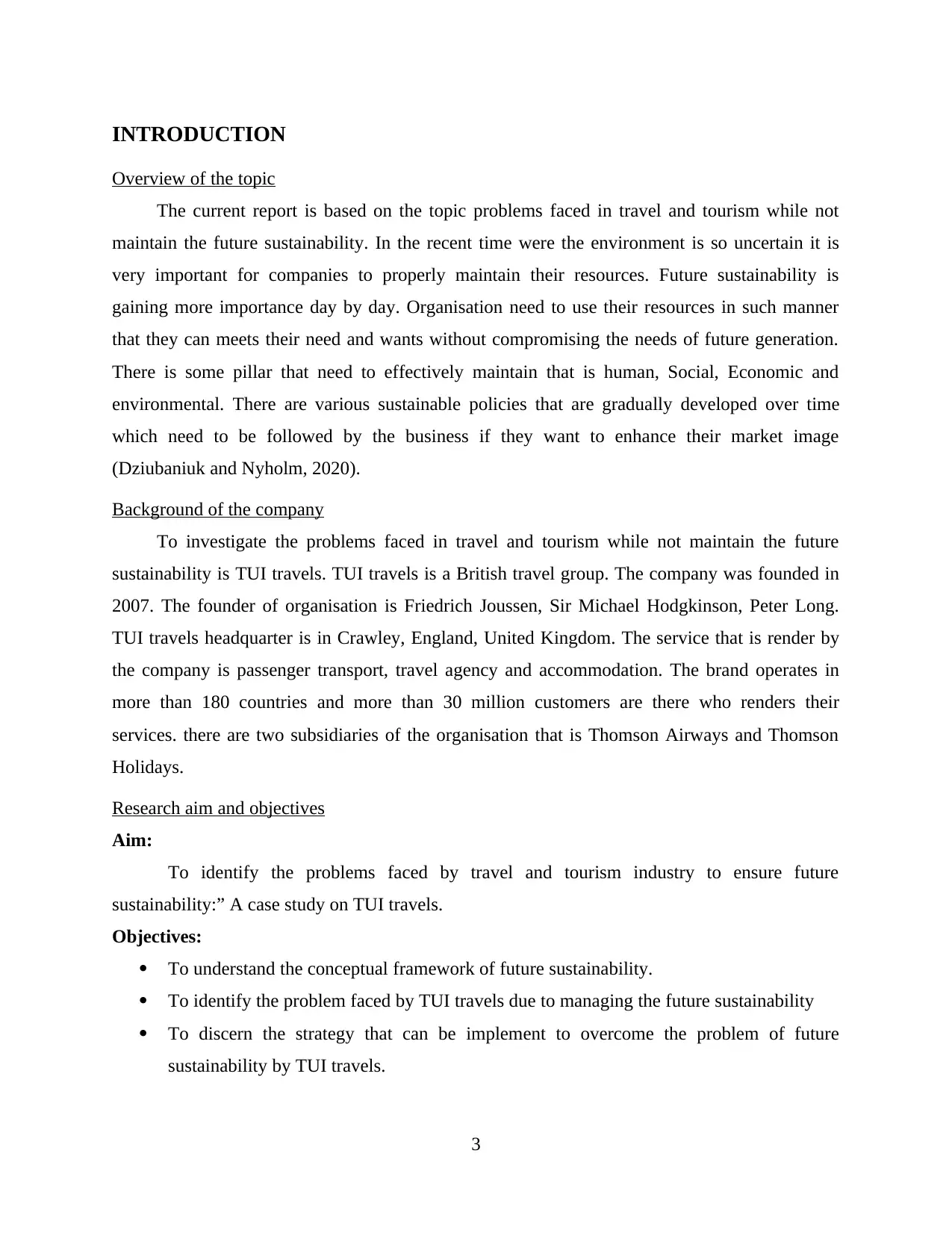
INTRODUCTION
Overview of the topic
The current report is based on the topic problems faced in travel and tourism while not
maintain the future sustainability. In the recent time were the environment is so uncertain it is
very important for companies to properly maintain their resources. Future sustainability is
gaining more importance day by day. Organisation need to use their resources in such manner
that they can meets their need and wants without compromising the needs of future generation.
There is some pillar that need to effectively maintain that is human, Social, Economic and
environmental. There are various sustainable policies that are gradually developed over time
which need to be followed by the business if they want to enhance their market image
(Dziubaniuk and Nyholm, 2020).
Background of the company
To investigate the problems faced in travel and tourism while not maintain the future
sustainability is TUI travels. TUI travels is a British travel group. The company was founded in
2007. The founder of organisation is Friedrich Joussen, Sir Michael Hodgkinson, Peter Long.
TUI travels headquarter is in Crawley, England, United Kingdom. The service that is render by
the company is passenger transport, travel agency and accommodation. The brand operates in
more than 180 countries and more than 30 million customers are there who renders their
services. there are two subsidiaries of the organisation that is Thomson Airways and Thomson
Holidays.
Research aim and objectives
Aim:
To identify the problems faced by travel and tourism industry to ensure future
sustainability:” A case study on TUI travels.
Objectives:
To understand the conceptual framework of future sustainability.
To identify the problem faced by TUI travels due to managing the future sustainability
To discern the strategy that can be implement to overcome the problem of future
sustainability by TUI travels.
3
Overview of the topic
The current report is based on the topic problems faced in travel and tourism while not
maintain the future sustainability. In the recent time were the environment is so uncertain it is
very important for companies to properly maintain their resources. Future sustainability is
gaining more importance day by day. Organisation need to use their resources in such manner
that they can meets their need and wants without compromising the needs of future generation.
There is some pillar that need to effectively maintain that is human, Social, Economic and
environmental. There are various sustainable policies that are gradually developed over time
which need to be followed by the business if they want to enhance their market image
(Dziubaniuk and Nyholm, 2020).
Background of the company
To investigate the problems faced in travel and tourism while not maintain the future
sustainability is TUI travels. TUI travels is a British travel group. The company was founded in
2007. The founder of organisation is Friedrich Joussen, Sir Michael Hodgkinson, Peter Long.
TUI travels headquarter is in Crawley, England, United Kingdom. The service that is render by
the company is passenger transport, travel agency and accommodation. The brand operates in
more than 180 countries and more than 30 million customers are there who renders their
services. there are two subsidiaries of the organisation that is Thomson Airways and Thomson
Holidays.
Research aim and objectives
Aim:
To identify the problems faced by travel and tourism industry to ensure future
sustainability:” A case study on TUI travels.
Objectives:
To understand the conceptual framework of future sustainability.
To identify the problem faced by TUI travels due to managing the future sustainability
To discern the strategy that can be implement to overcome the problem of future
sustainability by TUI travels.
3
⊘ This is a preview!⊘
Do you want full access?
Subscribe today to unlock all pages.

Trusted by 1+ million students worldwide
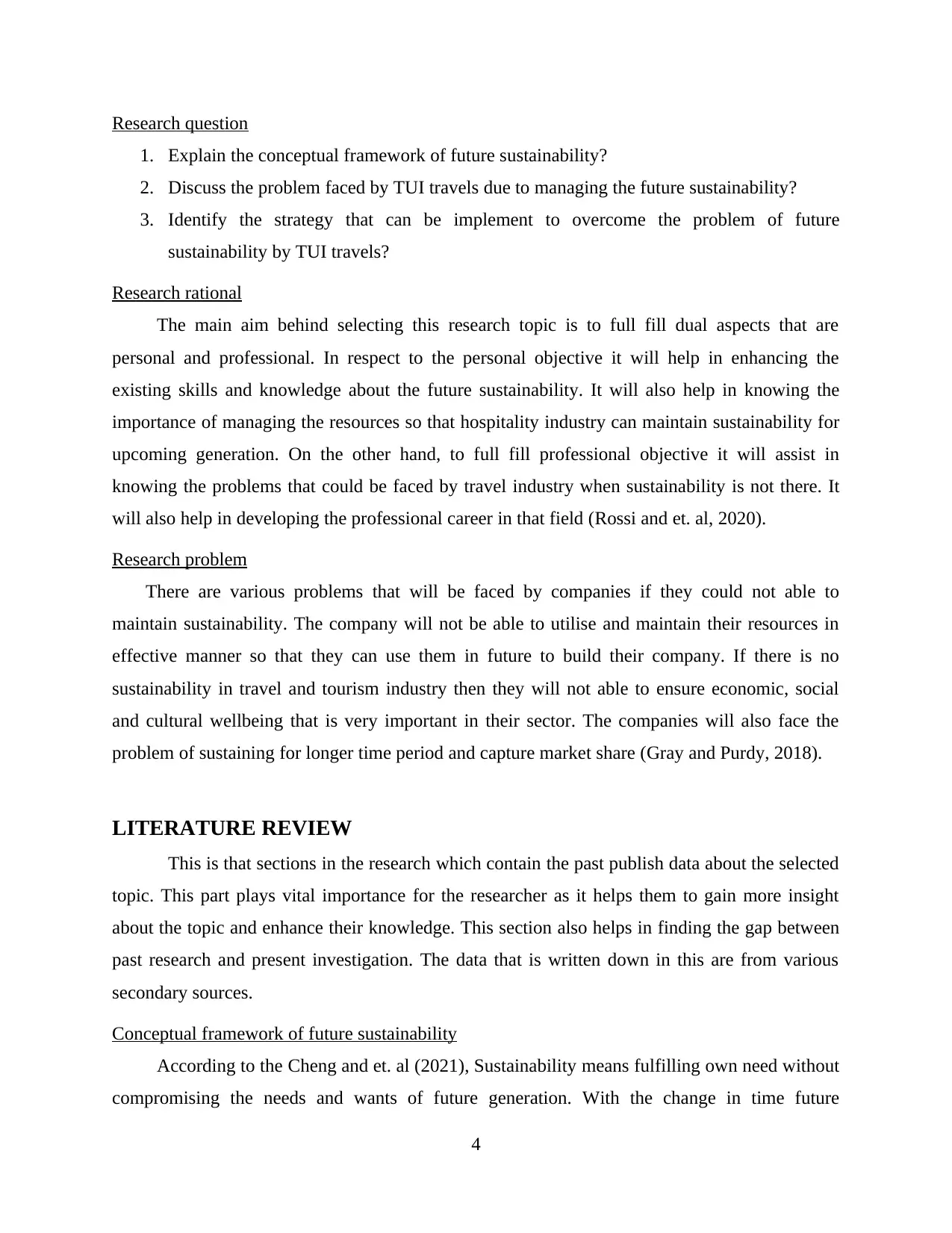
Research question
1. Explain the conceptual framework of future sustainability?
2. Discuss the problem faced by TUI travels due to managing the future sustainability?
3. Identify the strategy that can be implement to overcome the problem of future
sustainability by TUI travels?
Research rational
The main aim behind selecting this research topic is to full fill dual aspects that are
personal and professional. In respect to the personal objective it will help in enhancing the
existing skills and knowledge about the future sustainability. It will also help in knowing the
importance of managing the resources so that hospitality industry can maintain sustainability for
upcoming generation. On the other hand, to full fill professional objective it will assist in
knowing the problems that could be faced by travel industry when sustainability is not there. It
will also help in developing the professional career in that field (Rossi and et. al, 2020).
Research problem
There are various problems that will be faced by companies if they could not able to
maintain sustainability. The company will not be able to utilise and maintain their resources in
effective manner so that they can use them in future to build their company. If there is no
sustainability in travel and tourism industry then they will not able to ensure economic, social
and cultural wellbeing that is very important in their sector. The companies will also face the
problem of sustaining for longer time period and capture market share (Gray and Purdy, 2018).
LITERATURE REVIEW
This is that sections in the research which contain the past publish data about the selected
topic. This part plays vital importance for the researcher as it helps them to gain more insight
about the topic and enhance their knowledge. This section also helps in finding the gap between
past research and present investigation. The data that is written down in this are from various
secondary sources.
Conceptual framework of future sustainability
According to the Cheng and et. al (2021), Sustainability means fulfilling own need without
compromising the needs and wants of future generation. With the change in time future
4
1. Explain the conceptual framework of future sustainability?
2. Discuss the problem faced by TUI travels due to managing the future sustainability?
3. Identify the strategy that can be implement to overcome the problem of future
sustainability by TUI travels?
Research rational
The main aim behind selecting this research topic is to full fill dual aspects that are
personal and professional. In respect to the personal objective it will help in enhancing the
existing skills and knowledge about the future sustainability. It will also help in knowing the
importance of managing the resources so that hospitality industry can maintain sustainability for
upcoming generation. On the other hand, to full fill professional objective it will assist in
knowing the problems that could be faced by travel industry when sustainability is not there. It
will also help in developing the professional career in that field (Rossi and et. al, 2020).
Research problem
There are various problems that will be faced by companies if they could not able to
maintain sustainability. The company will not be able to utilise and maintain their resources in
effective manner so that they can use them in future to build their company. If there is no
sustainability in travel and tourism industry then they will not able to ensure economic, social
and cultural wellbeing that is very important in their sector. The companies will also face the
problem of sustaining for longer time period and capture market share (Gray and Purdy, 2018).
LITERATURE REVIEW
This is that sections in the research which contain the past publish data about the selected
topic. This part plays vital importance for the researcher as it helps them to gain more insight
about the topic and enhance their knowledge. This section also helps in finding the gap between
past research and present investigation. The data that is written down in this are from various
secondary sources.
Conceptual framework of future sustainability
According to the Cheng and et. al (2021), Sustainability means fulfilling own need without
compromising the needs and wants of future generation. With the change in time future
4
Paraphrase This Document
Need a fresh take? Get an instant paraphrase of this document with our AI Paraphraser
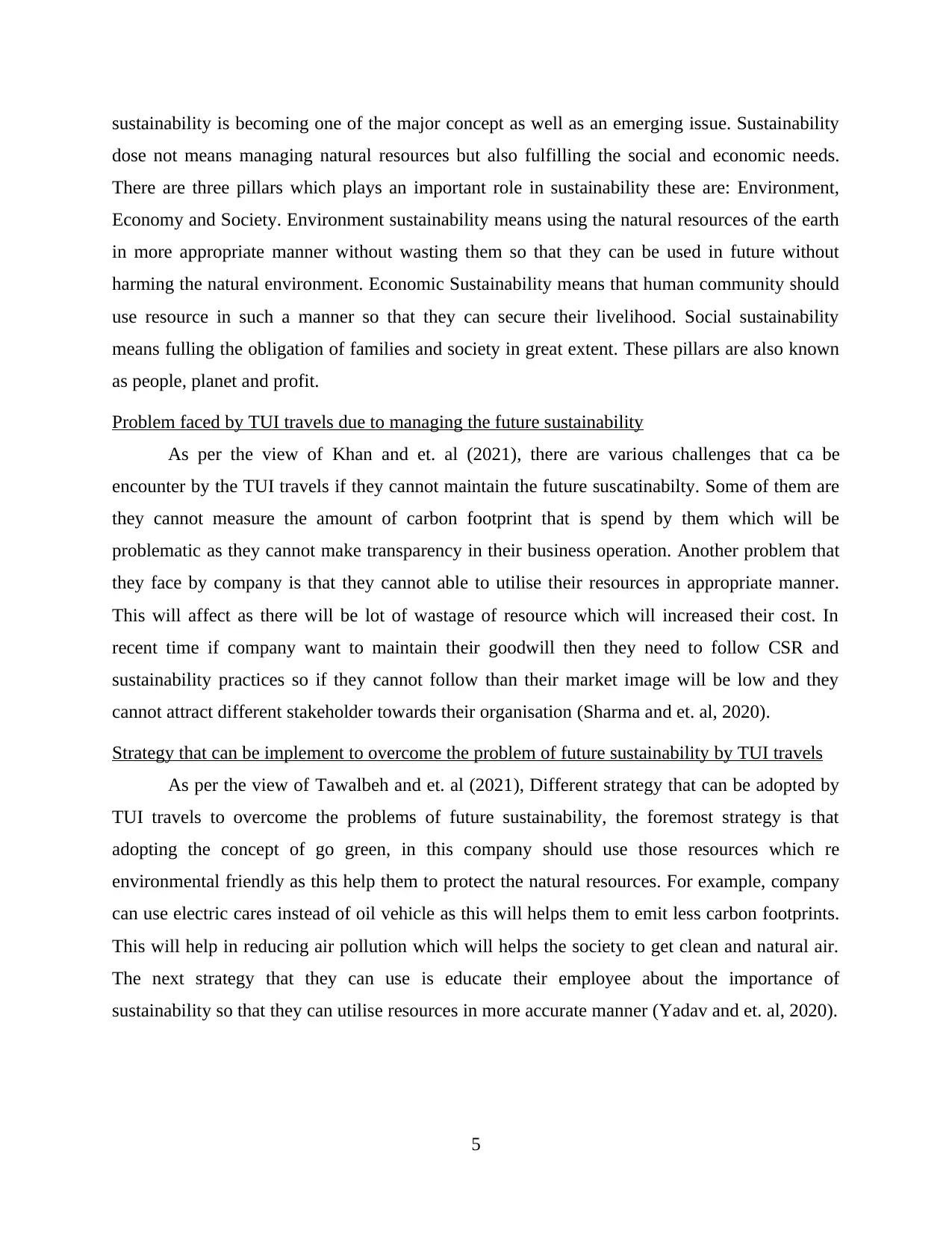
sustainability is becoming one of the major concept as well as an emerging issue. Sustainability
dose not means managing natural resources but also fulfilling the social and economic needs.
There are three pillars which plays an important role in sustainability these are: Environment,
Economy and Society. Environment sustainability means using the natural resources of the earth
in more appropriate manner without wasting them so that they can be used in future without
harming the natural environment. Economic Sustainability means that human community should
use resource in such a manner so that they can secure their livelihood. Social sustainability
means fulling the obligation of families and society in great extent. These pillars are also known
as people, planet and profit.
Problem faced by TUI travels due to managing the future sustainability
As per the view of Khan and et. al (2021), there are various challenges that ca be
encounter by the TUI travels if they cannot maintain the future suscatinabilty. Some of them are
they cannot measure the amount of carbon footprint that is spend by them which will be
problematic as they cannot make transparency in their business operation. Another problem that
they face by company is that they cannot able to utilise their resources in appropriate manner.
This will affect as there will be lot of wastage of resource which will increased their cost. In
recent time if company want to maintain their goodwill then they need to follow CSR and
sustainability practices so if they cannot follow than their market image will be low and they
cannot attract different stakeholder towards their organisation (Sharma and et. al, 2020).
Strategy that can be implement to overcome the problem of future sustainability by TUI travels
As per the view of Tawalbeh and et. al (2021), Different strategy that can be adopted by
TUI travels to overcome the problems of future sustainability, the foremost strategy is that
adopting the concept of go green, in this company should use those resources which re
environmental friendly as this help them to protect the natural resources. For example, company
can use electric cares instead of oil vehicle as this will helps them to emit less carbon footprints.
This will help in reducing air pollution which will helps the society to get clean and natural air.
The next strategy that they can use is educate their employee about the importance of
sustainability so that they can utilise resources in more accurate manner (Yadav and et. al, 2020).
5
dose not means managing natural resources but also fulfilling the social and economic needs.
There are three pillars which plays an important role in sustainability these are: Environment,
Economy and Society. Environment sustainability means using the natural resources of the earth
in more appropriate manner without wasting them so that they can be used in future without
harming the natural environment. Economic Sustainability means that human community should
use resource in such a manner so that they can secure their livelihood. Social sustainability
means fulling the obligation of families and society in great extent. These pillars are also known
as people, planet and profit.
Problem faced by TUI travels due to managing the future sustainability
As per the view of Khan and et. al (2021), there are various challenges that ca be
encounter by the TUI travels if they cannot maintain the future suscatinabilty. Some of them are
they cannot measure the amount of carbon footprint that is spend by them which will be
problematic as they cannot make transparency in their business operation. Another problem that
they face by company is that they cannot able to utilise their resources in appropriate manner.
This will affect as there will be lot of wastage of resource which will increased their cost. In
recent time if company want to maintain their goodwill then they need to follow CSR and
sustainability practices so if they cannot follow than their market image will be low and they
cannot attract different stakeholder towards their organisation (Sharma and et. al, 2020).
Strategy that can be implement to overcome the problem of future sustainability by TUI travels
As per the view of Tawalbeh and et. al (2021), Different strategy that can be adopted by
TUI travels to overcome the problems of future sustainability, the foremost strategy is that
adopting the concept of go green, in this company should use those resources which re
environmental friendly as this help them to protect the natural resources. For example, company
can use electric cares instead of oil vehicle as this will helps them to emit less carbon footprints.
This will help in reducing air pollution which will helps the society to get clean and natural air.
The next strategy that they can use is educate their employee about the importance of
sustainability so that they can utilise resources in more accurate manner (Yadav and et. al, 2020).
5
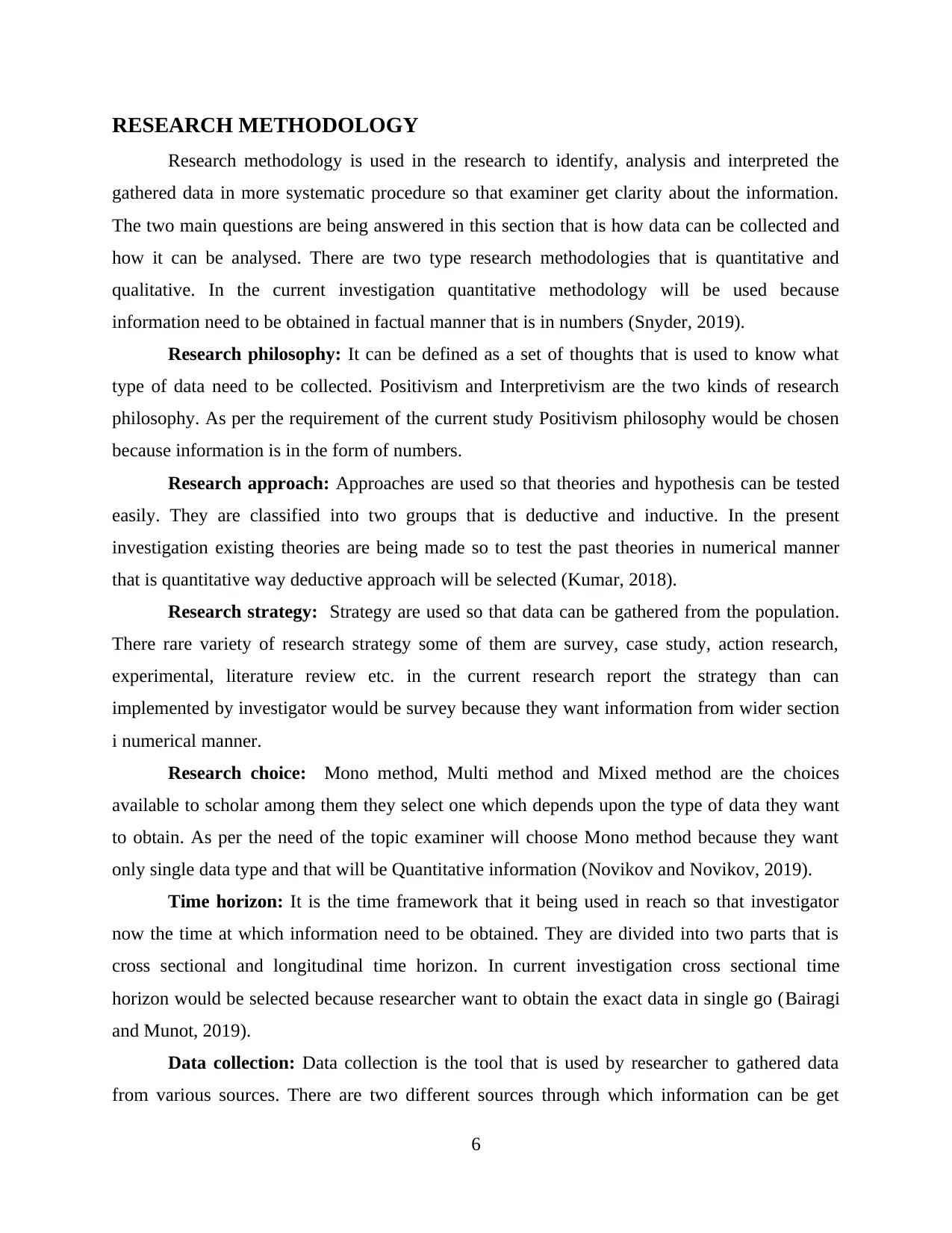
RESEARCH METHODOLOGY
Research methodology is used in the research to identify, analysis and interpreted the
gathered data in more systematic procedure so that examiner get clarity about the information.
The two main questions are being answered in this section that is how data can be collected and
how it can be analysed. There are two type research methodologies that is quantitative and
qualitative. In the current investigation quantitative methodology will be used because
information need to be obtained in factual manner that is in numbers (Snyder, 2019).
Research philosophy: It can be defined as a set of thoughts that is used to know what
type of data need to be collected. Positivism and Interpretivism are the two kinds of research
philosophy. As per the requirement of the current study Positivism philosophy would be chosen
because information is in the form of numbers.
Research approach: Approaches are used so that theories and hypothesis can be tested
easily. They are classified into two groups that is deductive and inductive. In the present
investigation existing theories are being made so to test the past theories in numerical manner
that is quantitative way deductive approach will be selected (Kumar, 2018).
Research strategy: Strategy are used so that data can be gathered from the population.
There rare variety of research strategy some of them are survey, case study, action research,
experimental, literature review etc. in the current research report the strategy than can
implemented by investigator would be survey because they want information from wider section
i numerical manner.
Research choice: Mono method, Multi method and Mixed method are the choices
available to scholar among them they select one which depends upon the type of data they want
to obtain. As per the need of the topic examiner will choose Mono method because they want
only single data type and that will be Quantitative information (Novikov and Novikov, 2019).
Time horizon: It is the time framework that it being used in reach so that investigator
now the time at which information need to be obtained. They are divided into two parts that is
cross sectional and longitudinal time horizon. In current investigation cross sectional time
horizon would be selected because researcher want to obtain the exact data in single go (Bairagi
and Munot, 2019).
Data collection: Data collection is the tool that is used by researcher to gathered data
from various sources. There are two different sources through which information can be get
6
Research methodology is used in the research to identify, analysis and interpreted the
gathered data in more systematic procedure so that examiner get clarity about the information.
The two main questions are being answered in this section that is how data can be collected and
how it can be analysed. There are two type research methodologies that is quantitative and
qualitative. In the current investigation quantitative methodology will be used because
information need to be obtained in factual manner that is in numbers (Snyder, 2019).
Research philosophy: It can be defined as a set of thoughts that is used to know what
type of data need to be collected. Positivism and Interpretivism are the two kinds of research
philosophy. As per the requirement of the current study Positivism philosophy would be chosen
because information is in the form of numbers.
Research approach: Approaches are used so that theories and hypothesis can be tested
easily. They are classified into two groups that is deductive and inductive. In the present
investigation existing theories are being made so to test the past theories in numerical manner
that is quantitative way deductive approach will be selected (Kumar, 2018).
Research strategy: Strategy are used so that data can be gathered from the population.
There rare variety of research strategy some of them are survey, case study, action research,
experimental, literature review etc. in the current research report the strategy than can
implemented by investigator would be survey because they want information from wider section
i numerical manner.
Research choice: Mono method, Multi method and Mixed method are the choices
available to scholar among them they select one which depends upon the type of data they want
to obtain. As per the need of the topic examiner will choose Mono method because they want
only single data type and that will be Quantitative information (Novikov and Novikov, 2019).
Time horizon: It is the time framework that it being used in reach so that investigator
now the time at which information need to be obtained. They are divided into two parts that is
cross sectional and longitudinal time horizon. In current investigation cross sectional time
horizon would be selected because researcher want to obtain the exact data in single go (Bairagi
and Munot, 2019).
Data collection: Data collection is the tool that is used by researcher to gathered data
from various sources. There are two different sources through which information can be get
6
⊘ This is a preview!⊘
Do you want full access?
Subscribe today to unlock all pages.

Trusted by 1+ million students worldwide
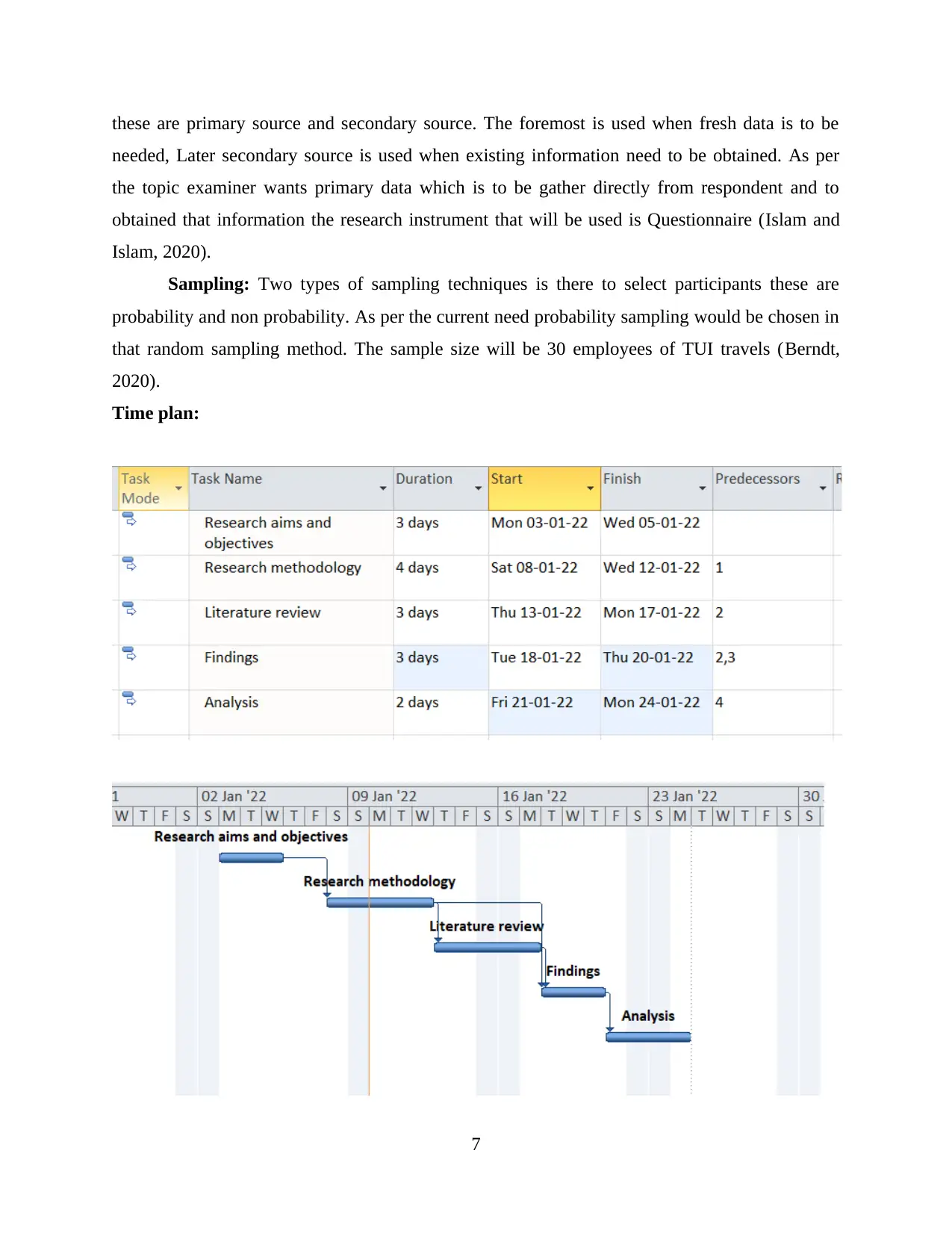
these are primary source and secondary source. The foremost is used when fresh data is to be
needed, Later secondary source is used when existing information need to be obtained. As per
the topic examiner wants primary data which is to be gather directly from respondent and to
obtained that information the research instrument that will be used is Questionnaire (Islam and
Islam, 2020).
Sampling: Two types of sampling techniques is there to select participants these are
probability and non probability. As per the current need probability sampling would be chosen in
that random sampling method. The sample size will be 30 employees of TUI travels (Berndt,
2020).
Time plan:
7
needed, Later secondary source is used when existing information need to be obtained. As per
the topic examiner wants primary data which is to be gather directly from respondent and to
obtained that information the research instrument that will be used is Questionnaire (Islam and
Islam, 2020).
Sampling: Two types of sampling techniques is there to select participants these are
probability and non probability. As per the current need probability sampling would be chosen in
that random sampling method. The sample size will be 30 employees of TUI travels (Berndt,
2020).
Time plan:
7
Paraphrase This Document
Need a fresh take? Get an instant paraphrase of this document with our AI Paraphraser

8
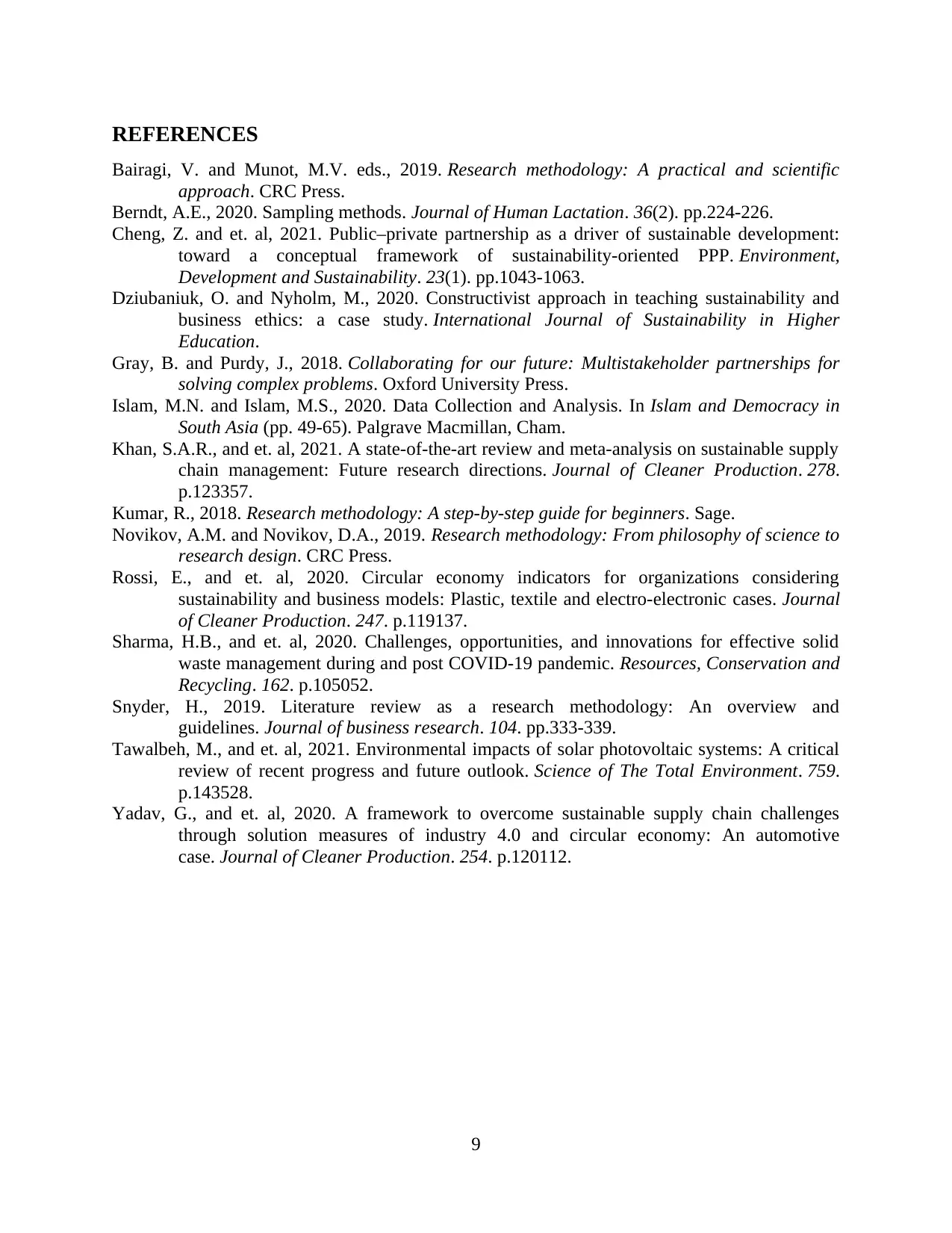
REFERENCES
Bairagi, V. and Munot, M.V. eds., 2019. Research methodology: A practical and scientific
approach. CRC Press.
Berndt, A.E., 2020. Sampling methods. Journal of Human Lactation. 36(2). pp.224-226.
Cheng, Z. and et. al, 2021. Public–private partnership as a driver of sustainable development:
toward a conceptual framework of sustainability-oriented PPP. Environment,
Development and Sustainability. 23(1). pp.1043-1063.
Dziubaniuk, O. and Nyholm, M., 2020. Constructivist approach in teaching sustainability and
business ethics: a case study. International Journal of Sustainability in Higher
Education.
Gray, B. and Purdy, J., 2018. Collaborating for our future: Multistakeholder partnerships for
solving complex problems. Oxford University Press.
Islam, M.N. and Islam, M.S., 2020. Data Collection and Analysis. In Islam and Democracy in
South Asia (pp. 49-65). Palgrave Macmillan, Cham.
Khan, S.A.R., and et. al, 2021. A state-of-the-art review and meta-analysis on sustainable supply
chain management: Future research directions. Journal of Cleaner Production. 278.
p.123357.
Kumar, R., 2018. Research methodology: A step-by-step guide for beginners. Sage.
Novikov, A.M. and Novikov, D.A., 2019. Research methodology: From philosophy of science to
research design. CRC Press.
Rossi, E., and et. al, 2020. Circular economy indicators for organizations considering
sustainability and business models: Plastic, textile and electro-electronic cases. Journal
of Cleaner Production. 247. p.119137.
Sharma, H.B., and et. al, 2020. Challenges, opportunities, and innovations for effective solid
waste management during and post COVID-19 pandemic. Resources, Conservation and
Recycling. 162. p.105052.
Snyder, H., 2019. Literature review as a research methodology: An overview and
guidelines. Journal of business research. 104. pp.333-339.
Tawalbeh, M., and et. al, 2021. Environmental impacts of solar photovoltaic systems: A critical
review of recent progress and future outlook. Science of The Total Environment. 759.
p.143528.
Yadav, G., and et. al, 2020. A framework to overcome sustainable supply chain challenges
through solution measures of industry 4.0 and circular economy: An automotive
case. Journal of Cleaner Production. 254. p.120112.
9
Bairagi, V. and Munot, M.V. eds., 2019. Research methodology: A practical and scientific
approach. CRC Press.
Berndt, A.E., 2020. Sampling methods. Journal of Human Lactation. 36(2). pp.224-226.
Cheng, Z. and et. al, 2021. Public–private partnership as a driver of sustainable development:
toward a conceptual framework of sustainability-oriented PPP. Environment,
Development and Sustainability. 23(1). pp.1043-1063.
Dziubaniuk, O. and Nyholm, M., 2020. Constructivist approach in teaching sustainability and
business ethics: a case study. International Journal of Sustainability in Higher
Education.
Gray, B. and Purdy, J., 2018. Collaborating for our future: Multistakeholder partnerships for
solving complex problems. Oxford University Press.
Islam, M.N. and Islam, M.S., 2020. Data Collection and Analysis. In Islam and Democracy in
South Asia (pp. 49-65). Palgrave Macmillan, Cham.
Khan, S.A.R., and et. al, 2021. A state-of-the-art review and meta-analysis on sustainable supply
chain management: Future research directions. Journal of Cleaner Production. 278.
p.123357.
Kumar, R., 2018. Research methodology: A step-by-step guide for beginners. Sage.
Novikov, A.M. and Novikov, D.A., 2019. Research methodology: From philosophy of science to
research design. CRC Press.
Rossi, E., and et. al, 2020. Circular economy indicators for organizations considering
sustainability and business models: Plastic, textile and electro-electronic cases. Journal
of Cleaner Production. 247. p.119137.
Sharma, H.B., and et. al, 2020. Challenges, opportunities, and innovations for effective solid
waste management during and post COVID-19 pandemic. Resources, Conservation and
Recycling. 162. p.105052.
Snyder, H., 2019. Literature review as a research methodology: An overview and
guidelines. Journal of business research. 104. pp.333-339.
Tawalbeh, M., and et. al, 2021. Environmental impacts of solar photovoltaic systems: A critical
review of recent progress and future outlook. Science of The Total Environment. 759.
p.143528.
Yadav, G., and et. al, 2020. A framework to overcome sustainable supply chain challenges
through solution measures of industry 4.0 and circular economy: An automotive
case. Journal of Cleaner Production. 254. p.120112.
9
⊘ This is a preview!⊘
Do you want full access?
Subscribe today to unlock all pages.

Trusted by 1+ million students worldwide
1 out of 9
Related Documents
Your All-in-One AI-Powered Toolkit for Academic Success.
+13062052269
info@desklib.com
Available 24*7 on WhatsApp / Email
![[object Object]](/_next/static/media/star-bottom.7253800d.svg)
Unlock your academic potential
Copyright © 2020–2026 A2Z Services. All Rights Reserved. Developed and managed by ZUCOL.





